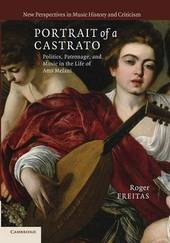
|
Portrait of a Castrato: Politics, Patronage, and Music in the Life of Atto Melani
Paperback / softback
Main Details
| Title |
Portrait of a Castrato: Politics, Patronage, and Music in the Life of Atto Melani
|
| Authors and Contributors |
By (author) Roger Freitas
|
| Series | New Perspectives in Music History and Criticism |
|---|
| Physical Properties |
| Format:Paperback / softback | | Pages:452 | | Dimensions(mm): Height 254,Width 178 |
|
| Category/Genre | Baroque music (c 1600 to c 1750)
Bands, groups and musicians |
|---|
| ISBN/Barcode |
9781107696105
|
| Classifications | Dewey:782.0092 |
|---|
| Audience | | Professional & Vocational | |
|---|
|
Publishing Details |
| Publisher |
Cambridge University Press
|
| Imprint |
Cambridge University Press
|
| Publication Date |
1 May 2014 |
| Publication Country |
United Kingdom
|
Description
This book explores the fascinating life of the most documented musician of the seventeenth century. Born in 1626 into a bourgeois family in Pistoia, Italy, Atto Melani was castrated to preserve his singing voice and soon rose to both artistic and social prominence. His extant letters not only depict the musical activities of several European centers, they reveal the real-life context of music and the musician: how a singer related to patrons and colleagues, what he thought about his profession, and the role music played in his life. Whether Atto was singing, spying, having sex, composing, or even rejecting his art, his life illustrates how music-making was always also a negotiation for power. Providing a rare glimpse of the social and political contexts of seventeenth-century music, Roger Freitas sheds light on the mechanisms that generated meaning for music, clarifying what music at this time actually was.
Author Biography
Roger Freitas is Associate Professor in the Department of Musicology, Eastman School of Music, University of Rochester.
Reviews'The book includes a survey of Atto's cantatas, polished, efficient exemplars of a fashionable new Italian genre, but in the end far less important to their creator than the wordly advancement their performances brought with it. Richly documented, this whole extraordinary chronicle of the eunuch as self-made man is one of the most absorbing studies in its field to have appeared in recent years.' The Times Literary Supplement
|